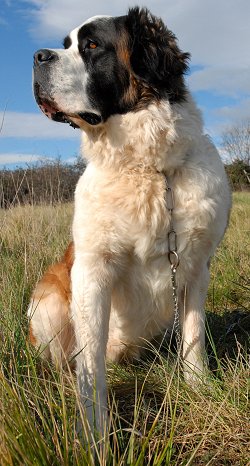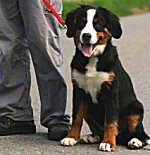Saint Bernards: What's Good About 'Em, What's Bad About 'Em
Saint Bernard temperament, personality, training, behavior, pros and cons, advice, and information, by Michele Welton, Dog Trainer, Behavioral Consultant, Author of 15 Dog Books

A well-bred Saint Bernard is calm, relaxed, and sensible. That is, a well-bred, adult Saint Bernard is calm, relaxed, and sensible.
Young Saints are as boisterous and bouncy and silly as any other breed and must be patiently taught not to jump on people and not to run around the house indoors, lest furniture and breakables go flying.
All Saint Bernards need space and deserve a roomy home with a spacious fenced yard in the suburbs or country. This breed needs daily exercise (whether he seems to want it or not) to stay fit. Long daily walks will do, along with regular opportunities to stretch out and lope around.
Most Saints love to romp in the snow, and pulling a cart or carrying a backpack gives him a purpose in life.
Companionship is of prime importance to this sociable breed. Left alone too much, he becomes dispirited – and destructive.
With strangers, most Saints are relaxed and accepting, but some individuals are more outgoing, while others are more introspective and standoffish.
Because of the breed's size and strength, he requires early and frequent excursions into the world so that he grows up to trust (or at least respect) other people.
Unfortunately, there are some bad temperament genes in the breed's gene pool. Dogs who inherit genes for a high-strung, timid, or suspicious temperament can be just as difficult to live with as those who inherit genes for aggression.
Most Saint Bernards are fine with other animals when raised with them. But there is some dog aggression, which can be frightening to experience because of this breed's sheer bulk and power.
Saints have an independent streak, but they are willing to please if you can establish consistent rules through motivational training methods that include praise and food rewards.
Saint Bernards are hard to beat as droolers, slobberers, and loud contented snorers.
If you want a dog who...
- Is massive, heavy, and powerful, with a thick furry coat
- Is usually kind and steady-tempered with everyone
- Loves pulling carts and sleds and romping in cold weather
- Is responsive to training in a slow, good-natured way
A Saint Bernard may be right for you.
If you don't want to deal with...
- A very bulky dog who takes up a lot of space in your house and car
- A heavy dog who wants to sit on your feet and lean his weight against your leg
- Rowdiness and exuberant jumping when young
- Loneliness and destructiveness when left alone too much
- Fearfulness or aggression in some lines, or when not socialized enough
- Some stubbornness and/or dominance problems, especially in males
- Heavy shedding
- Slobbering and drooling
- Potential for serious health problems and a short lifespan
A Saint Bernard may not be right for you.
 |
Dog Breed Traits – Which Traits Are Right For You? In this brand new series, I'll help you decide which dog breed traits would best suit you and your family, your home and yard, and your lifestyle, so you can choose the best dog breed for your family. |
Keep in mind that the inheritance of temperament is less predictable than the inheritance of physical traits such as size or shedding. Temperament and behavior are also shaped by raising and training.
FREE eBooks by Michele Welton
![]() "Respect Training for Puppies" and "Teach Your Dog 100 English Words" are free step by step guides to teaching your pup to be calm and well-behaved.
"Respect Training for Puppies" and "Teach Your Dog 100 English Words" are free step by step guides to teaching your pup to be calm and well-behaved.
![]() "11 Things You Must Do Right To Keep Your Dog Healthy and Happy" is a free guide to keeping your dog mentally, physically, and emotionally happy and healthy so you can enjoy a longer lifetime of companionship.
"11 Things You Must Do Right To Keep Your Dog Healthy and Happy" is a free guide to keeping your dog mentally, physically, and emotionally happy and healthy so you can enjoy a longer lifetime of companionship.

More traits and characteristics of the Saint Bernard
If I was considering a Saint Bernard, I would be most concerned about...
- Providing the proper balance of exercise. Young Saint Bernards need enough exercise to keep them lean and healthy, but not so much that their soft growing bones, joints, and ligaments become over-stressed and damaged. Adult Saint Bernards need more exercise to keep them in shape, but not in hot or humid weather for fear of overheating. The proper amount of exercise can be difficult to regulate in giant breeds.
Since you need to minimize their exercise, young Saint Bernards can be rambunctious, romping with uncoordinated gawkiness all over your house. You need to substitute extra quantities of companionship and supervision during this time. Otherwise, left alone, young Saint Bernards become bored and destructive, and their powerful jaws can literally destroy your living room. I strongly recommend that you get your Saint Bernard involved in obedience classes at the intermediate or advanced level, or pulling a cart or sled, or hiking and swimming.
- Providing enough socialization. Saint Bernards need extensive exposure to people and to unusual sights and sounds. Otherwise their natural caution can become extreme shyness, suspiciousness, or aggression, all of which are difficult to live with, especially with such a massive dog.
- Heavy shedding. Saint Bernards shed a LOT. You'll find hair and fur all over your clothing, upholstery, carpeting, under your furniture, on your countertops, even in your food. Make sure everyone in your family is okay with this.
- Slobbering. Most people are not prepared for how much Saint Bernards slobber and drool. When they shake their heads after eating or drinking, you will literally be toweling saliva and slime off your clothes and furniture.
- Serious health problems. The lifespan of a Saint Bernard is short, and an alarming number of Saints are crippled by bone and joint diseases and/or succumb to cancer in middle age.
- Stronger temperament than you might think. Though Saint Bernards look like huge teddy bears, they are not pushovers to raise and train. Some individuals, especially males, are willful and dominant (they want to be the boss) and will make you prove that you can make them do things. You must show them, through absolute consistency, that you mean what you say. Some Saint Bernard males are also dominant or aggressive toward other male dogs.
In other words, you must teach your Saint Bernard to respect you. A dog who respects you will do what you say and will stop what he's doing when you tell him "No." Follow my free online training programs.
My best-selling books – now available FREE on my website
 Respect Training For Puppies: 30 seconds to a calm, polite, well-behaved puppy is for puppies 2 to 18 months old. Your puppy will learn the 21 skills that all family dogs need to know. Click here to read for free.
Respect Training For Puppies: 30 seconds to a calm, polite, well-behaved puppy is for puppies 2 to 18 months old. Your puppy will learn the 21 skills that all family dogs need to know. Click here to read for free. Teach Your Dog 100 English Words is a unique Vocabulary and Respect Training Program that will teach your adult dog to listen to you and do what you say. Click here to read for free.
Teach Your Dog 100 English Words is a unique Vocabulary and Respect Training Program that will teach your adult dog to listen to you and do what you say. Click here to read for free. 11 Things You Must Do Right To Keep Your Dog Healthy and Happy helps your dog live a longer, healthier life. Get my honest advice about all 11 Things before you bring home your new puppy, because some mistakes with early health care cannot be undone. Click here to read for free.
11 Things You Must Do Right To Keep Your Dog Healthy and Happy helps your dog live a longer, healthier life. Get my honest advice about all 11 Things before you bring home your new puppy, because some mistakes with early health care cannot be undone. Click here to read for free.Related posts you might enjoy






